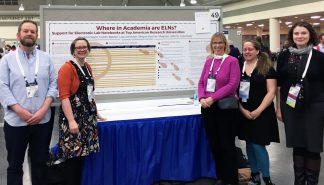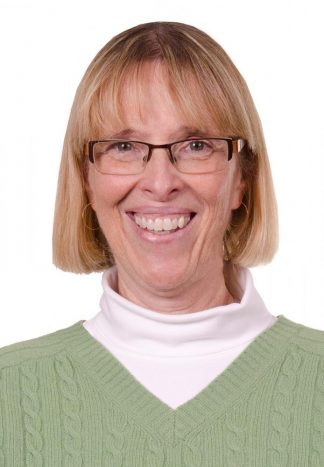By Allison Campbell-Jensen
Julie Kelly’s hallmark helpfulness led to a career in the University Libraries. While working as a microbiologist in an infectious disease laboratory at the U’s Medical School, she noted that her favorite part of the job was library research. Others noticed, too, and soon she was helping colleagues with library work at a time when the catalog was on cards, not online, and challenging to use.
Kelly says: “I thought ‘I should be doing this all day long.’ So I quit my job and went to library school.” She recently retired as a Science Librarian who worked with Horticulture, Applied Economics, and Ecology, Evolution, and Behavior, on the St. Paul campus, having mentored many colleagues and carried out projects with national and international impact.
“People want to be a Julie,” says Shannon Farrell, Natural Resources Librarian. “They want to foster collaboration and communication like Julie has been able to. She really is capable of doing it all and making it look effortless and remaining positive with her can-do attitude.” Farrell is among those Kelly has mentored and advised.
Mentor to many

Julie Kelly, third from left, with colleagues at conference presentation. From left: Franklin Sayre, Megan Kocher, Julie Kelly, Megan Lafferty, Caitlin Bakker.
After a short time in a corporate library and a stint in the then-Bio-Medical Library, Kelly came to the St. Paul campus in 2000. It was there she both formally and informally mentored many new librarians, says Philip Herold, Libraries Director for Sciences, Agriculture, and Engineering.
“One of the more challenging things for new librarians is to develop a research agenda and do research as part of their professional development,” he says. “Julie was really good at taking people under her wing to get them started with publishing and presentations.”
She also advised Farrell while she was pursuing a position as full Librarian last summer. Says Farrell: “She’s very good at dispensing advice, offering her opinion, looking for paths forward, and generating new ideas.”
As with many other librarians, she and Kelly became collaborators. Their topics were gray literature — reports, working papers, government documents, and other research developed outside of typical academic and commercial channels — and historical analog data. Kelly is positive and motivating, Farrell says. “I can’t think of many other collaborators whom I’ve had who are so full of energy and initiative.”
Kelly also collaborated on an ongoing evidence synthesis training institute with Megan Kocher, Librarian for Soil, Water and Climate, Animal Science, and Food Science and Nutrition, and Social Sciences Librarian Amy Riegelman. The Institute of Museum and Library Services funds the institute, which trains librarians in systematic review tools few outside of health sciences were previously taught.
Kelly also has been active in the Agriculture Network Information Center (AgNIC), the Association of College & Research Libraries, and the United States Agricultural Information Network (USAIN). She played a key role in bringing the USAIN 2012 conference to Minnesota, notes Herold.
“She’s a driven person, very task oriented, a high achiever,” Herold says.
Along with her service to national organizations, she’s also had a global reach through AgEcon Search.
Global influence
“She’s there behind the scenes, helping, connecting a lot of people who have intersected her life.”
—Philip Herold
AgEcon Search, a collaborative project of the U of M’s Department of Applied Economics and the U of M Libraries, collects, indexes, and electronically distributes full-text copies of working papers and more than 100 journals in the broadly defined field of agricultural and applied economics. With her co-manager, Linda Eells, Department of Applied Economics Librarian, Kelly has traveled to conferences around the world to recruit contributors.
“She’s a big-picture gal,” Eells says, “[skilled at] identifying and working with members of our global community.”
At those conferences, in places from Australia to South America, Tunisia to Slovenia, Kelly would engage with the attendees, showing them the power of the repository.
“People don’t think of a librarian job as being a global traveling job but this one is,” Eells says. Kelly also trained people, such as a current member of the AgEcon Search Advisory Board, to search more effectively and efficiently, Eells says.
“She’s amazing at working with people,” Eells says, “so service-oriented, creative, super-smart — always ahead of the curve in thinking about what we should be doing and can be doing for people.”
Under Kelly’s leadership, AgEcon Search has grown from a “resource with 6,000 papers from 50 organizations to its current impressive size and scope, with over 150,000 papers from 350 organizations in 40 countries,” Herold says. In 2019, users of the repository downloaded 22 million documents. “That’s a big legacy,” he adds. In retirement, she will continue to volunteer with the project and is training Farrell to replace her.
A generous spirit
Demonstrating her generous spirit while serving on the board of the Friends of the University Libraries from 2011 to 2017, Kelly was quick to offer other board members rides to events and readily volunteered to be a greeter or to help in any way. She was a great outreach person, says Lanaya Stangret, Friends Coordinator.
Kelly is known for her generosity, Herold says, and for caring for others.
“She’s there behind the scenes, helping, connecting a lot of people who have intersected her life.”
Adds Farrell: “She’s just a great person to talk to and a great person to work with. So kind and so giving and willing to offer her time to anybody.”
Eells calls her “a volunteer extraordinaire,” noting that she organizes friends to serve at Second Harvest Heartland, Open Arms of Minnesota, and other nonprofit organizations. As part of her retirement gift to herself, Herold says, she set up a scholarship fund at North Carolina Central University, which is the only ALA-accredited Master of Library and Information Science program at an HBCU.
As Kelly looks back, she takes satisfaction from being able to help undergraduates, grad students, and faculty members with their questions, “to be that link and to make it all more efficient for them.”
And she is proud of taking part in the University’s mission to serve the people of the state. Kelly says: “It’s a nice place to spend your energy.”





